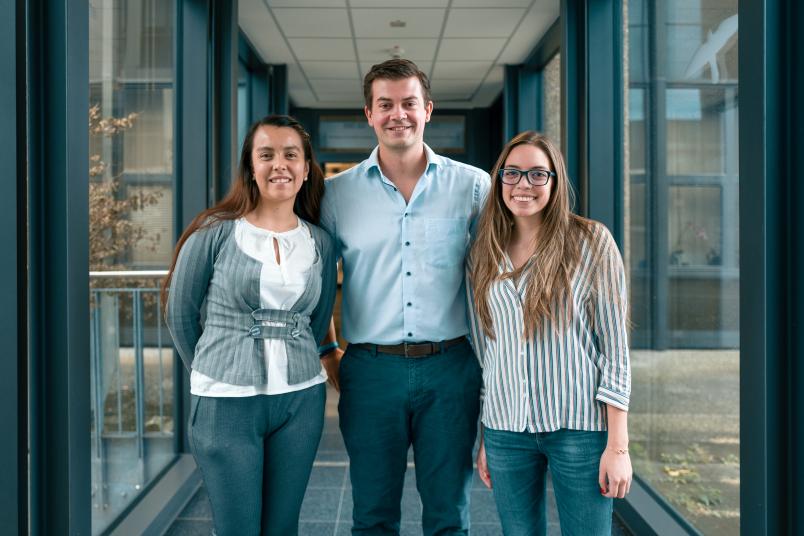
Exchange
Study and research in Bochum and Bogotá
Two students from Colombia and a RUB researcher from the Institute of Electronic Circuits discuss how they have benefitted from international exchange.
Dr Christoph Baer from the Institute of Electronic Circuits has been collaborating with Universidad Nacional de Colombia for four years and knows how rewarding international exchange can be. This is why he, together with the Lab Exchange programme, invited students Angélica Parra Ladino and Juanita Fernández Ortega to Bochum for a period of three weeks in July 2019. In our interview, they share their thoughts on their exchange experience and discuss the reasons why Baer is travelling to Colombia in August.
Ms Parra and Ms Fernandéz, why are you taking part in the Lab Exchange programme?
Angélica Parra Ladino: It is a great opportunity for us. At our university in Colombia, we do have research opportunities, but we don’t have all necessary resources. Plus, we can establish networks between our university and Ruhr-Universität.
Juanita Fernández Ortega: I’d also like to improve my German. This is something I can do here.
What was it like to be in Bochum?
Parra: It was great to get to know all those research opportunities as well as student life. It’s very different in Colombia.

A lot of things are very organised in Bochum.
Angélica Parra Ladino
What is different?
Parra: A lot of things. Here, the campus is very big, there are many buildings. In Colombia, the buildings on campus are rather small. And a lot of things are very organised here.
Fernández: I like that we can use a lot of equipment for our own research projects without having to wait for them.
Dr Baer, why have you organised this exchange with Lab Exchange?
Christoph Baer: I got to know Universidad Nacional during a research project. And we had a PhD student from Colombia who spent a year at our Institute. Plus, I have been teaching in Colombia as visiting researcher on a regular basis. There are many motivated students there. This is why I decided that we should strengthen our collaboration.
In what way?
Baer: I learned of the Bachelor Double Degree option. This is a degree programme where students study at two universities at the same time. The Double Degree Programme in electrical engineering and information technology is supposed to start shortly, and it will require both German and Colombian students to spend some time at the respective other university. We have worked with Lab Exchange to test this type of collaboration.
Moreover, it was a good opportunity to support Angélica Parra Ladino and Juanita Fernández Ortega in their individual research projects. They are going back to Colombia as multipliers, so to speak. That’s because they are now aware of the benefits of academic exchange and can share their knowledge with their fellow students – and inspire them to take the Bachelor Double Degree, too.
Ms Parra and Ms Fernandéz, which kind of research projects did you carry out during your research stay?
Fernandéz: I have developed a sensor for magnetic fields as part of my Bachelor’s thesis. Its purpose is to measure magnetic fields generated by lightning.
Parra: My research in Bochum was for my Master’s thesis. It’s about researching into where lightning strikes. The work is computer-aided. In Bochum, I had the simulation servers at my disposal that are necessary to analyse my research subject. In the three weeks I spent here, I collected almost all the data I need.
How is the experience going to affect your future?
Fernandéz: To me, it’s pretty clear. I’ll be able to pursue the upcoming double degree in my current degree course and return to Bochum for that purpose.
Parra: The exchange has inspired me to pursue a PhD degree here. But I haven’t made the final decision yet.

Both the participants and the faculty benefit from Lab Exchange, as it attracts motivated students to Bochum.
Christoph Baer
In what way is this exchange useful for your faculty and RUB, Dr. Baer?
Baer: In the field of electrical engineering, there aren’t many exchange programmes yet. By bringing people together who live on different continents, Lab Exchange, helps them tap into their potential, as they make new experiences that are useful for their degrees and their future research. Both the participants and the faculty benefit from it, as it attracts motivated students to Bochum.
In August, you’ll be spending three weeks in Colombia. Why?
Baer: I’ll be holding lectures, just as I have been doing for the last four years, and tell the students what it’s like to study in Bochum. I’m bringing along a RUB student who’ll be laying the groundwork for his Master’s thesis in Colombia. He, too, is supported by Lab Exchange.
Moreover, I’ll be preparing the Bachelor Double Degree and, hopefully, finalise it so that it can be launched shortly. This endeavour is funded by Lab Exchange and the German Academic Exchange Service.
Good luck!